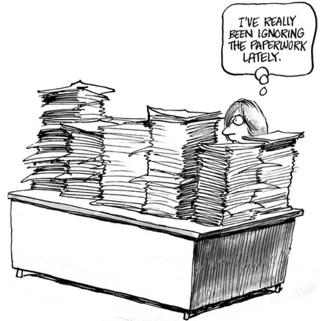Occupational stress is stress that is caused by the workplace, which is one of the most common sources of stress for many of us. Unfortunately, because it can be hard to change jobs – especially if you have a family that depend on you – occupational stress will very often be a chronic form of stress with no easy solution. As ongoing stress is liable to cause a wide range of different health conditions, it’s very important to ensure that you do everything you can to try and reduce the stress or at least to minimize and manage the symptoms.

Here we will look at how the workplace can cause stress and what you can do to get it under control.
Sources of Occupational Stress
The source of occupational stress obviously is your occupation. However, a lot of different things can fall under that category and it will often be specific aspects of a job that tend to make you feel more or less stressed. Here are some of the things that can make going to work, or thinking about work, more stressful:
- Having an overbearing and unpleasant boss
- Feeling that you aren’t doing a good job/can’t do your job well
- Not getting on with colleagues
- Feeling time pressure
- Not feeling rewarded by your job/feeling stuck in a ‘rut’
- Having a long and stressful commute
- Having an uncomfortable work environment
- Having to deal with confrontational clients or customers
- Worrying that you are not safe in your current position
- Knowing that your business is struggling
All of these things can cause a large amount of pressure that can result in you ‘taking your work home with you’. In turn, this leaves you worrying about work and dreading the next day even when you’re supposed to be off work and relaxing. This is ‘occupational stress’ and it is something you should address immediately. After all, if your job makes you so miserable that you can’t enjoy your free time, then what is the point in it?
How to Address Occupational Stress
The list above describes a large number of sources of workplace stress but is by no means comprehensive. Nevertheless, many of these items and the other causes of stress are things that you can address using the following methods…
Speaking to the Boss
If you are unhappy with your work environment, if you feel you aren’t being given enough time, or if you feel that you aren’t being challenged enough… these are all things that your boss will be able to control. In other words, if you speak with them about whatever it is that’s making you unhappy, they might be able to help by moving you to another department or by lessening your workload.
Improving Your Working Environment
If you’re currently dreading going into work every day, then you’d probably be very surprised at just how much of a difference it can make to change the working environment slightly. Many people who struggle with workplace stress will find that their environment feels dark or claustrophobic and that this then exacerbates their anxiety.
One of the simplest things to do to improve your working environment and address occupational stress might be to introduce a potted plant to your desk. Plants have been shown to help workers feel more relaxed – and in fact even looking at the color green has been shown to do the same. If you can move nearer to a window (avoiding any glare on the screen) then this could also have a similar effect.
More important though is feeling relaxed and at ease while you’re working and being comfortable. The best offices these days use an open plan design and let their employees move around freely to mix up their environment. Again, this is something to consider speaking with your boss about if you’re not happy in your current office space.
Changing Your Workflow
If you feel snowed under by your workload or you find you are constantly going home with things hanging over you, then you may also want to consider changing your workflow to work more efficiently and thus get more done before the end of the day.
Many people can benefit greatly from learning to delegate more of their workload to their colleagues or subordinates, while the use of tools can also help. Making a rule to only check your e-mail at certain times throughout the day can also make a great difference. The Four Hour Body by Tim Ferriss is a book with a lot of tips on how to improve your workflow so that you can get more done more easily and feel less stressed in the process.
Take a Break
Sometimes all you need to deal better with workplace stress is to take a break. This might mean taking a holiday and getting some time away from your 9-5 just to get some perspective and to recharge your batteries, or it might mean taking a break during your working day. If you struggle with stress while you’re at work, then take ten minutes out to go for a short walk and you can come back feeling highly refreshed. You may have to clear this with your manager but if you explain that it is actually good for your daily productivity (and point out that it’s only the equivalent of a smoking break) then you should find that they don’t have a problem with it.
Change Your Reaction
Stress is a psychological condition meaning that it’s entirely moderated by your state of mind. The cause of occupational stress then is not just your occupation but also your reaction to your occupation and your interpretation of events.
This doesn’t mean that any stress is ‘your fault’ but what it does mean is that the same stressful event happening to two different people will have a different level of impact for each person. You know this yourself no doubt from observing other people – some of your colleagues likely just don’t care enough to get stressed about things that happen at work so they are immune to workplace stress.
Now this is just an example. It’s really not advisable that you ‘don’t care’ about your job as this is only likely to end with you getting fired (or at the very least it will negatively impact on the quality of service that your end client is getting). The point though is, that your interpretation of what is happening is just as important as what actually happens.
To better cope with workplace stress then, you just need to change the way you think about the events as they transpire. If you have a big deadline coming up, then you need to realize that you can only do what you can do and that if you don’t finish in time then that’s probably management’s fault for giving you too much work. As long as you work well and you are conscientious, then ‘what will be, will be’.
And then, when you get home from work, you need to make sure you are capable of just switching off from the stress, forgetting about whatever it is that’s hanging over you at work and relaxing at home so that you can return tomorrow feeling reinvigorated.
This is all easier said than done of course but if you struggle, then consider seeing a cognitive behavioral therapist. They specialize in teaching patients to restructure their thoughts in a manner that is ultimately better for coping.
Fear Setting
Going back to Tim Ferriss for a moment, another very useful tool when it comes to getting your stresses in perspective is something called ‘fear setting’. Fear setting is basically the process of defining your fears and this can be a remarkably useful in helping you to realize precisely what it is that is causing you stress so that you can find ways to avoid that.
If you are stressed about work right now then, take a moment to write down all the things you are worried might happen. Are you worried on some level that you might get fired? Are you stressed that you don’t get on with your colleagues?
Once you write these down you can then assess how likely each of them is to be a problem – for instance, are you really in danger of getting fired? Remember that it’s actually very difficult for an organization to fire someone and in order to do so they need to have very good grounds. Chances are that if you’re the sort of conscientious person who struggles with occupational stress, you’re not also the sort of person who is in danger of losing their job.
Meanwhile, this also allows you to come up with contingency plans. Worries about not being popular? Then wouldn’t you just make friends in another way? Joining a class or similar is a much better way to find people who share similar interests.
Look Elsewhere
If you’ve tried everything else and you still find yourself dealing with occupational stress, then your last recourse is simply to look for alternative employment. It’s not worth being very stressed about your job – so if you aren’t happy, move.
What you may find though is that as soon as you start looking elsewhere, you immediately feel less pressure and your occupational stress subsides. Having a ‘light at the end of the tunnel’ can do wonders all on its own.




